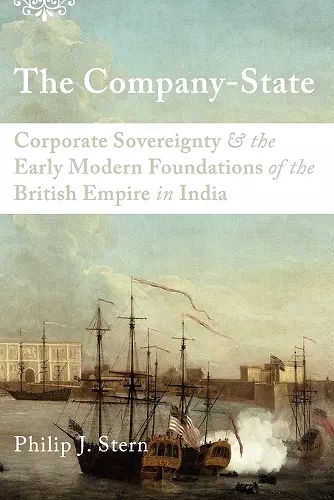The Company-State
Corporate Sovereignty and the Early Modern Foundations of the British Empire in India
Format:Paperback
Publisher:Oxford University Press Inc
Published:29th Nov '12
Currently unavailable, and unfortunately no date known when it will be back
This paperback is available in another edition too:
- Hardback£98.00(9780195393736)

Almost since the event itself in 1757, the English East India Company's victory over the forces of the nawab of Bengal and the territorial acquisitions that followed has been perceived as the moment when the British Empire in India was born. Examining the Company's political and intellectual history in the century prior to this supposed transformation, The Company-State rethinks this narrative and the nature of the early East India Company itself. In this book, Philip J. Stern reveals the history of a corporation concerned not simply with the bottom line but also with the science of colonial governance. Stern demonstrates how Company leadership wrestled with typical early modern problems of political authority, such as the mutual obligations of subjects and rulers; the relationships among law, economy, and sound civil and colonial society; the constitution of civic institutions ranging from tax collection and religious practice to diplomacy and warmaking; and the nature of jurisdiction and sovereignty over people, territory, and the sea. Their ideas emerged from abstract ideological, historical, and philosophical principles and from the real-world entanglements of East India Company employees and governors with a host of allies, rivals, and polyglot populations in their overseas plantations. As the Company shaped this colonial polity, it also confronted shifting definitions of state and sovereignty across Eurasia that ultimately laid the groundwork for the Company's incorporation into the British empire and state through the eighteenth century. Challenging traditional distinctions between the commercial and imperial eras in British India, as well as a colonial Atlantic world and a "trading world" of Asia, The Company-State offers a unique perspective on the fragmented nature of state, sovereignty, and empire in the early modern world.
With great skill, Stern has extracted from the archives a cogent and highly engaging narrative of events that even participants found highly tremendously confusing. He deftly conveys the world of the East India company, marshaling striking visual materials and wonderfully evocative quotations from a wide array of Company documents. * Radical History Review *
A thought-provoking reinterpretation that will compel us to reexamine assumptions about colonial companies in general. * H-Net *
In a work of deep erudition and striking originality Philip Stern deftly demolishes many of the categories by which we try to organize our work: are states and companies really different animals, were the early modern Atlantic and Indian Oceans distinct worlds, what, if anything, was new about the post-Plassey British Indian empire? We are politely but firmly directed back to the drawing board. * P. J. Marshall, King's College London *
In The Company-State, Philip Stern has made an important contribution not only to studies of empire, but to early modern history in general. This is an important and innovative reconsideration of the East India Company as a political actor in the first phase of its career. This incisively crafted book will be widely read, cited, and debated. * Sanjay Subrahmanyam, University of California, Los Angeles *
A bracing re-thinking of the early modern East India Company and its role in shaping English practices of empire, governance, 'trade,' and polity, Philip Stern's book will replace all previous studies on the topic. * Kathleen Wilson, Stony Brook University *
- Winner of Winner of the Morris D. Forkosch Prize of the American Historical Association Honorable mention, Ralph Gomory Prize of the Business History Conference.
ISBN: 9780199930364
Dimensions: 155mm x 231mm x 18mm
Weight: 476g
316 pages